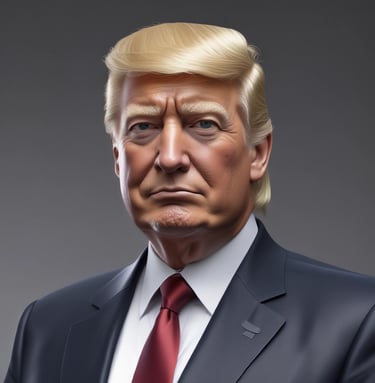Donald Trump Criticizes EU for Purchasing Russian Oil
Former U.S. President Donald Trump has launched a sharp attack on the European Union, criticizing its continued purchase of Russian oil despite the ongoing geopolitical tensions. Speaking at a public address, Trump said he “does not want Europe to keep funding Moscow through energy deals” and urged EU leaders to adopt a tougher stance against Russia.


By: Bharat Daily Samachar Daily: 15 Sep,2025
Donald Trump Criticizes EU for Buying Russian Oil, Urges Europe to Take Stronger Stand Against Moscow
Former U.S. President Donald Trump has once again sparked debate on international trade and energy security, this time targeting the European Union for its continued reliance on Russian oil. In his latest remarks, Trump accused European leaders of indirectly supporting Moscow’s economy despite ongoing political tensions and sanctions. He urged the EU to adopt a tougher stance and reduce dependence on Russian energy supplies, arguing that continued purchases undermine Western efforts to isolate Russia.
Trump’s Sharp Criticism of Europe
Speaking at a political event in the United States, Trump did not mince words when discussing Europe’s energy policies. He said he “does not want them to keep buying Russian oil,” adding that such trade contradicts the EU’s stance on sanctions and weakens the collective efforts of Western allies.
According to Trump, Europe’s dependence on Russian oil sends a “mixed signal” to the world—on one hand, leaders condemn Moscow’s actions, but on the other hand, they continue to fund its economy through energy deals.
“Europe cannot claim to be tough on Russia while writing checks for its oil,” Trump said, urging European nations to diversify their energy sources and align more closely with U.S. policies.
The Context: Europe’s Energy Challenge
Trump’s remarks come at a time when the European Union has been struggling to balance energy security with political commitments. Over the past decade, Russia has been one of Europe’s largest suppliers of oil and natural gas. Despite efforts to reduce this dependence, Europe still relies on Moscow for a significant portion of its energy needs.
The Russia-Ukraine conflict further exposed the vulnerabilities of Europe’s energy dependence. While sanctions were imposed to weaken Moscow, the EU’s continued imports of Russian oil and gas have raised questions about the effectiveness of these measures. Trump’s comments directly highlight this contradiction, reflecting ongoing concerns within the U.S. about Europe’s approach.
Trump’s Energy Policy Stance
Throughout his political career, Trump has emphasized energy independence and criticized America’s allies for what he sees as overreliance on hostile or adversarial nations. His latest comments align with his long-standing argument that Western nations must prioritize self-reliance in energy production.
During his presidency, Trump supported expanding U.S. oil and gas production and encouraged allies to purchase American energy exports. His criticism of the EU now suggests that he believes Europe should explore similar alternatives rather than continuing trade with Moscow.
Reactions to Trump’s Statement
Trump’s comments have quickly attracted attention in both the U.S. and Europe. Supporters argue that his criticism is valid and that Europe’s reliance on Russian oil undermines global efforts to curb Moscow’s influence. Critics, however, view the remarks as overly simplistic, pointing out that Europe’s energy transition is a complex process that cannot be resolved overnight.
Energy analysts say Trump’s comments reflect real concerns but may underestimate the challenges Europe faces. “Diversifying energy supplies requires not just political will but also infrastructure, investment, and time. Europe is moving in that direction, but immediate dependence on Russia cannot be cut off instantly,” one analyst explained.
Europe’s Efforts to Diversify
It is important to note that the European Union has already taken significant steps toward reducing its reliance on Russian energy. Over the past few years, the EU has increased imports from alternative suppliers, including the United States, the Middle East, and African nations.
Additionally, European countries have accelerated investment in renewable energy sources such as wind, solar, and hydro power. The long-term goal is to achieve energy independence while meeting climate change commitments.
However, despite these efforts, Russian oil and gas still play a major role in Europe’s energy consumption. The sheer scale of demand, combined with logistical and economic factors, makes a complete shift away from Moscow a gradual process rather than an immediate one.
Broader Geopolitical Implications
Trump’s criticism highlights not only energy issues but also broader geopolitical dynamics. The United States has consistently pressured Europe to reduce reliance on Russia, framing energy independence as a matter of security. By calling out the EU, Trump is reinforcing the narrative that Europe must do more to align with Western strategies against Moscow.
For European leaders, this creates additional pressure to demonstrate progress on energy diversification. Failure to act decisively may invite further criticism from both the U.S. and within the EU itself.
Looking Ahead
As Europe continues its transition, Trump’s remarks may add urgency to ongoing policy discussions. The EU has already pledged to cut Russian oil imports significantly over the coming years, but the pace of change remains a subject of debate. With global energy prices fluctuating and geopolitical tensions persisting, the challenge of balancing economic stability with political commitments remains daunting.
Meanwhile, Trump’s intervention once again shows how energy policy and geopolitics are deeply intertwined. His comments may resonate with audiences who view energy dependence as a weakness, particularly in times of global uncertainty.
Conclusion
The Supreme Court of public opinion—both in Europe and the United States—will ultimately decide whether Trump’s words carry weight. For now, his criticism has reignited a crucial debate about energy dependence, security, and the role of Russia in global markets.
By calling on Europe to “take a tougher stand,” Trump is adding pressure on EU leaders to accelerate their shift away from Russian oil. Whether his words translate into policy changes remains to be seen, but they have undoubtedly brought fresh attention to one of the most pressing issues facing Europe today.
